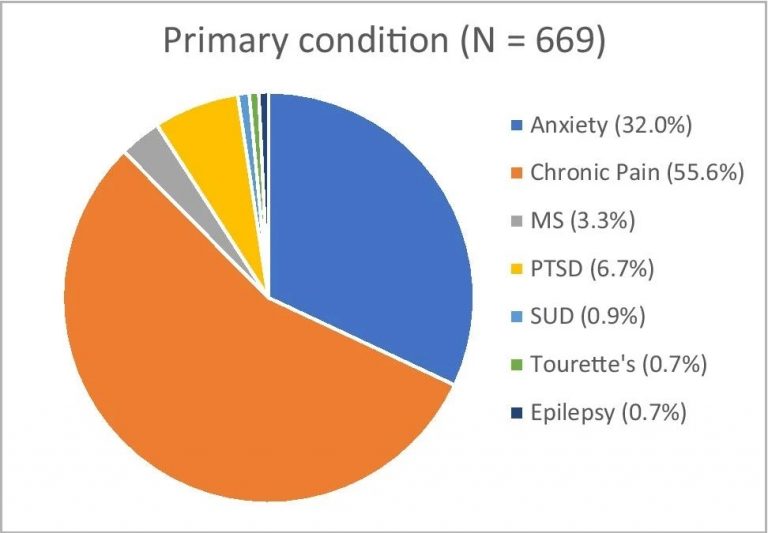
The preliminary results from Project Twenty21 show patient improvements in quality-of-life measures, and ability to manage anxiety, insomnia and depression.
The first findings from the UK’s largest ever medical cannabis patient study, Project Twenty21, have been published in the esteemed journal Psychopharmacology. These findings show that legally prescribed cannabis provides clinically significant improvements in the quality of life of patients living with conditions such as chronic pain, multiple sclerosis, Tourette’s syndrome, epilepsy, and Post Traumatic Stress Disorder (PTSD).
What is Project Twenty21?
Project Twenty21 is an observational study, established in 2019 by Drug Science, to provide a framework that pairs patients with specialist clinicians that are experienced with prescribing medicinal cannabis. The study gathers important patient data on the safety and tolerability of medicinal cannabis, while simultaneously improving patient access.
To support and fund the study, five licensed medical cannabis producers including Bod Australia, have adapted the costs of their medicines to allow more people to afford them and therefore access medical cannabis.
“We want to give people who suffer from chronic and severe conditions that haven’t had luck with conventional treatment options the chance to try something that could really alleviate their suffering,” said Jo Patterson, the CEO of Bod.”
Prospective participants were evaluated by trained clinicians and if deemed eligible, were prescribed medicinal cannabis. Patients enrolled in this study had at least two ‘failed treatments’ on their medical records, where commonly prescribed medications, such as opioids, had little to no effect on their ability to manage their conditions. Participants’ health and progress on the medicines was assessed periodically using a standardised and validated questionnaire of health-related quality of life. This method is also used to study patients with other conditions, such as cancer, cardiovascular disease and dementia.
Findings from the study
This is the first published Real World Data to be collected on medical cannabis in the UK. The major findings from the interim analysis of 678 participants show:
- Most patients in the study were prescribed medicinal cannabis for chronic pain, then anxiety, PTSD, multiple sclerosis, substance use disorder, Tourette’s syndrome and epilepsy.
- Using medicinal cannabis led to a fifty percent increase in patients’ self-reported health and ability to lead a more normal life.
- Significant improvements in patients’ ability to manage debilitating secondary conditions such as anxiety, insomnia and depression were also reported.
- Patients are now able to avoid criminality with legal prescriptions, as many have felt compelled to turn to illegal use in an attempt to manage their pain/ life-limiting conditions.
- Medicinal cannabis prescriptions provide an opportunity to reduce and stop reliance on widely available medicines, like opioids, that can come with serious side effects, including dependency.

Figure 1 from the publication summarises the primary condition for these individuals who received prescribed cannabis in this study.
“These results show that for some people with severe and debilitating conditions and who substantially poorer health, treatment with prescribed medicinal cannabis is providing relief and improving their health-related quality of life,” said Dr Adele Hosseini, Chief Scientific Officer at Bod Australia.
Despite medicinal cannabis being legalized in the UK in 2018, access for patients remains a challenge due to numerous conditions, including prohibitive cost and doctor support.
Professor David Nutt, founder of Drug Science says, “A lack of clinical evidence has made it difficult for doctors to confidently prescribe legal medical cannabis in the UK. These new findings provide a major step forward, and help to clarify the benefit these medicines can have for thousands of seriously ill patients.”
More details on the Project Twenty21 study and results can be found in Drug Science’s announcement or by reading the publication in Psychopharmacology.
Real World Data being collected on medical cannabis in Australia

Bod Australia is conducting an Australia-wide observational study to investigate the safety and efficacy of their medicinal cannabis for specific treatment-resistant indications.
This study is collecting real-world data on their CBD-dominant medicines for indications including chronic pain, anxiety disorders, sleep disorders, depression, arthritis and epilepsy for up to 12 months.
Patient access to medicinal cannabis remains an issue in both the UK and Australia.
“As doctors and regulatory bodies are calling for more evidence, collecting real-world data from patients using medicinal cannabis in Australia and the UK will help build the evidence base required to support doctors and improve patient access,” said Dr Hosseini.
Disclaimer: Bod Australia has no control over which products are entered into the Project Twenty 21 formulary or are prescribed by its clinicians. Neither does Bod Australia have any influence over the study’s outcomes.


